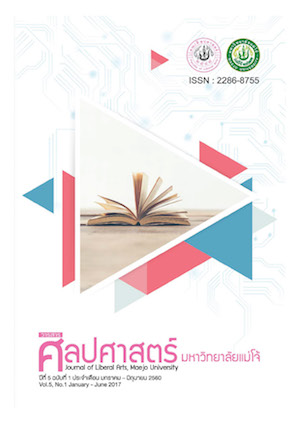การตอบปฏิเสธการแสดงความปรารถนาดีในภาษาไทย: การศึกษากลวิธีทางภาษา และข้อคำนึงที่เป็นเหตุจูงใจ (The Refusal of the good intention in Thai: A study of linguistic strategies and native speakers’ motivational concerns)
Main Article Content
Abstract
บทความวิจัยนี้มีวัตถุประสงค์เพื่อต้องการศึกษากลวิธีทางภาษาที่ผู้พูดภาษาไทยใช้ในการตอบปฏิเสธการแสดงความปรารถนาดีในภาษาไทยและข้อคำนึงที่เป็นเหตุจูงใจหรือปัจจัยที่ผู้พูดภาษาไทยคำนึงถึงในการเลือกใช้กลวิธีทางภาษาในการตอบปฏิเสธการแสดงความปรารถนาดีตามแนวคิดวัจนปฏิบัติศาสตร์แนวปลดปล่อย (Emacipatory Pragmatics) โดยใช้แบบสอบถามประเภท Discourse Completion Test (DCT) จากกลุ่มตัวอย่างผู้พูดภาษาไทยที่เป็นนักศึกษาระดับปริญญาตรีหลากหลายคณะและหลากหลายชั้นปีจำนวน 100 คน และจากการสัมภาษณ์เชิงลึกกลุ่มตัวอย่างจำนวน 30 คน ผลการวิจัยพบว่าผู้พูดภาษาไทยเลือกใช้กลวิธีทางภาษาแบบลดน้ำหนักความรุนแรงในการตอบปฏิเสธการแสดงความปรารถนาดีมากกว่ากลวิธีทางภาษาแบบตรงไปตรงมา ส่วนข้อคำนึงที่เป็นเหตุจูงใจหรือปัจจัยที่ผู้พูดภาษาไทยคำนึงถึงในการใช้กลวิธีทางภาษาในการแสดงความไม่พอใจมี 2 ส่วน คือ 1.ข้อคำนึงที่เป็นเหตุจูงใจหรือปจั จัยในส่วนที่เป็นวัตถุประสงค์ของการสนทนา และ 2.ข้อคำนึงที่เป็นเหตุจูงใจหรือปัจจัยในส่วนที่เป็นปริบทของการสนทนา โดยการรักษาความสัมพันธ์ของคู่สนทนาเป็นข้อคำนึงที่เป็นเหตุจูงใจหรือปัจจัยที่ผู้พูดภาษาไทยส่วนใหญ่คำนึงถึงมากที่สุดในการใช้กลวิธีทางภาษาในการตอบปฏิเสธการแสดงความปรารถนาดีพฤติกรรมทางภาษาดังกล่าวมีความสัมพันธ์กับปัจจัยทางสังคมวัฒนธรรม 3 ประการ ได้แก่ 1. การมีมุมมองตัวตนแบบพึ่งพา (an interdependent view of self) 2.ความเป็นสังคมแบบอิงกลุ่ม (collectivism) และ 3.ความเป็นวัฒนธรรมปริบทสูง (High context culture)
This research article aims to study linguistic strategies that Thai people adopted to express the refusal of the good intention, as well as to study native speakers’ motivational concerns while performing the act. The first part of the result indicates that Thai speakers adopted mitigating strategies more frequently than bold-on record strategies. The second part of the result reveals that there are two types of motivational concerns-1) motivational concerns relating to the purpose of conversation 2) motivational concerns relating to the context of conversation. It found that Thai speakers place a priority on keeping relationship with the interlocutor. This linguistic behavior might be motivated by three sociocultural factors : an interdependent view of self, collectivism and high context culture.
Article Details
Section
Academic Article
ต้นฉบับที่ได้รับการตีพิมพ์ในวารสารคณะศิลปศาสตร์ มหาวิทยาลัยแม่โจ้ ถือเป็นกรรมสิทธิ์ของมหาวิทยาลัยแม่โจ้ ห้ามนำข้อความทั้งหมดหรือบางส่วนไปพิมพ์ซ้ำ เว้นเสียแต่จะได้รับอนุญาตจากมหาวิทยาลัยฯ เป็นลายลักษณ์อักษร

